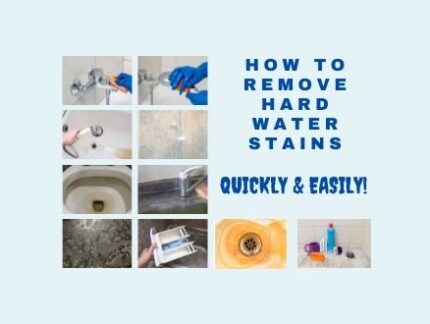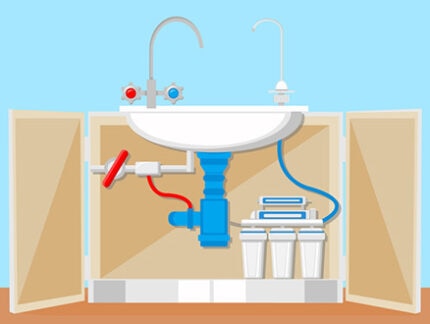Although it is mainly an aesthetic issue, living with hard water can be difficult. It negatively affects the home and belongings in several ways. It is possible that you already experience the signs of hard water in your home without notice.
You may not know this, but the type of water you consume impacts your health and the entire household.
Many homeowners spend their resources treating the effects of hard water without being aware. By learning how to tell if you have hard water, you can save time and money. You can also improve your water quality and effectively get rid of your hard water problems. Let’s get to it!

What is Hardness in water?
The term “Hardness” is used to describe water containing high levels of alkaline earth metals. It is caused by divalent cations – mainly calcium ions and other pre-dissolved metallic ions. The level of hardness varies and is determined by measuring the total hardness level of the water.
On the other hand, soft water describes water that contains a reduced amount of calcium or magnesium minerals. The difference between hard and soft water is based on the number of dissolved minerals found in the water. The temperature or pH level also determines the hardness or softness of the water.
More people prefer to use soft water than hard water because it causes less mineral build-up on surfaces. It is also more effective for performing house chores because it cleans better. Asides from this, soft water is better used in commercial places like public pools, bathhouses, and aquariums. Soft water also contains a higher level of sodium ions than hard water.
People often mistake hard water symptoms for high water TDS. Even though they are closely related, hard water and TDS are not the same. TDS (Total Dissolved Solids) shows the total amount of dissolved mineral substances in the water. It refers to the general content of all organic and inorganic materials found in the water.
Water hardness doesn’t always occur due to high TDS. Hardness in water means high levels of metallic minerals like calcium and magnesium in the water. Naturally, soft water can get contaminated from mineral build-up in pipes or underground supply facilities.
What are The 11 Signs of Hard Water?
You can learn how to tell if you have hard water by yourself without spending a dime. Hard water symptoms are common and reflect in signs listed below
Build-up of soap scum
Hard water causes a build-up of soap scum. They are whitish spots that stick to surfaces after the water evaporates. This occurs because mineral ions in hard water and the soap agents do not mix well. When hard water is mixed with soap, the minerals start to react by separating from the water. What then happens is that the water dries up and leaves mineral deposits behind.
Soap scum has a hard texture and is not easily removed. Scum quickly forms anywhere hard water comes in contact with soap. They leave bathroom/toilet surfaces with a constantly dirty appearance. Suppose you notice plenty of these nasty white spots on your bathroom walls, shower curtains, etc. This might be a sign that you have hard water.
Warning
- Build-up of scum on shower curtain can cause a bacterial infection and harm your health.
No soap suds
There are many signs of soft water, but the most common one is to observe your soap lather. Soft water doesn’t contain hard minerals, and so it blends well with soap. If you mix soft water with a little soap, it produces a thick lather. However, with hard water, it isn’t easy to get a good lather.
Tip
- Mix soap water and observe the lather. No lather indicates hard water.
Limescale
Limescale is another way to tell if you have hard water. It is often confused with soap scum because it also leaves a whitish substance. The mineral ions in hard water do not react well in the solution. So when the calcium ion comes in contact with a hard surface, it separates from the water and sticks to it. As it separates, it forms a solid scale that covers the object.
The scale is called limescale, and it is commonly found in places that come in contact with a lot of water, for example:- water tap, shower head, etc. Limescale doesn’t appear as quickly as soap scum but gradually forms over time.
Look closely at your shower nuzzle, sink faucet, etc. If you have hard water, you will notice a clear, whitish scale covering these surfaces. You cannot get rid of limescale with an ordinary soap or cleaning agent. It also stops water passage where there is a build-up.
Tip
- You can temporarily remove limescale from your shower head or faucet by soaking it in vinegar or lemon juice for an hour.
Spots on dishes and glasses
Do you notice hard spots on your plates and glasses after washing? If yes, that is an indication of hard water. These spots are formed by the mineral, and they appear after the water has dried. For example, if no matter how much you wash the dishes, they still look unclean. It means that you might have hard water.
Stains on bathtubs and toilet tiles
Hard water causes reddish-brown stains on a bathtub and toilet tiles. These stains are the combined result of limescale, scum, and other reactions from the water. You cannot permanently remove these stains until you start using soft water.
Suppose you’re thinking of removing those stains with either soap or a cleaning agent that will be frustrating for you, sure! Special arrangements are needed to remove hard water stains.
Less water pressure in your home (clogged pipes)
Hard water also affects your plumbing. Most households get their water directly from the ground or municipal service lines. The water then travels through pipes, where it collects hard minerals and other solid materials. These substances block the pipe and eventually stops the water from passing through.
Tip
- If you use PVC or copper pipes, you won’t suffer this problem so much.
Clogged pipes are one of the main effects and signs of hard water. If you constantly need to adjust the water pressure from your tap or shower, you probably have hard water.
Tip
- If you use PVC or copper pipes, you won’t suffer this problem so much.
Filmy residue on hair after wash
When you wash your hair with hard water, you will feel a slimy residue on your hair. It typically feels as if the hair is still unclean and you haven’t washed off the soap.
Dry skin and itchiness
Soap lather helps soap rinse off properly. If the soap doesn’t lather well, the soap will stick to your body and won’t come off. This results in skin irritation and leads to itchiness or ashy skin.
Caution
- If your skin is highly sensitive, hard water can damage the skin. It can also result in eczema break out or a worse skin condition.
Faded laundry
Doing laundry with hard water can be very frustrating. Mineral build-up acts upon the clothing and gives them a dull look after wash. Hard water also causes your face to have a perpetually dirty look.
Reduced lifespan of household appliances
Hard water damaged appliances and fixtures in the household. Kettles, Irons, Shower Heads, tap faucets will need constant repair or replacement.
Disagreeable taste in drinking water
Soft water is colorless and does not have any noticeable taste. If your drinking water is clean but still has an odd or strong metallic taste, it is hard.
Are There Any Benefits of Hard Water?
More focus is placed on the adverse effects of hard water than the positive effects, so people often wonder if there are any.
Drinking hard water can be advantageous to your health. Hard water is rich in calcium, magnesium, iron, and other helpful mineral substances.
The body benefits from the minerals that cause hardness in water. Research also shows that drinking hard water helps to improve cardiovascular conditions.
Caution
- Consult with your doctor if you have any underlying health issues before starting hard water therapy.
Health Risks Associated with Hard Water
According to the WHO, there is no evidence that hard water causes adverse health effects on humans. Regardless, hard water contains harsh minerals that cause unfavorable skin conditions like dermatitis.
Simple Solutions to Hard Water Problems
Before you convert hard water to soft water, you need to conduct a hard water test. A test will determine the hardness level and what solution you should try. There are several ways to convert hard water to soft water. Boiling hard water affects temperature and reduces hardness. This method is only temporary and not 100% effective. A more sustainable solution is to install a water softener.
The two types of water softeners include; salt-based softeners and salt-free softeners. If you don’t want a water softener, you can purchase a water conditioner. The conditioner is an alternative to salt-based softeners, which can be harmful to people who require a low sodium diet.
An effective water conditioner enables your appliances to support the mineral content in hard water without causing damage. You can as well consult a professional before you decide on what kind of method to try.
Conclusion
By now, you will have learned how to tell if you have hard water and hard water signs you need to observe. Hard water affects many households, but you don’t have to risk the effects of hard water anymore. You can now also decide to stick with hard water or transition to soft water.










